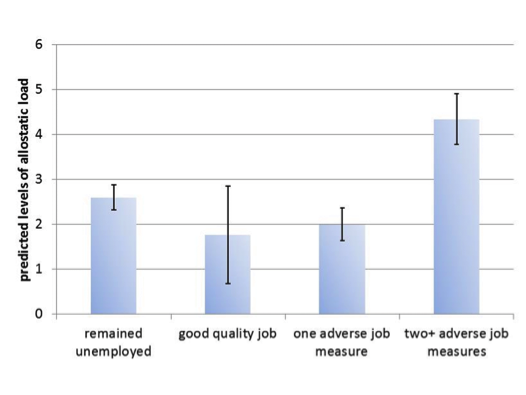Is Any Job Really Better than No Job At All?

Lord Layard posed the question is “any job is better than no job” in a seminal paper in which he concluded that “human happiness is more affected by whether or not one has a job than by what kind of job it is”. This may have been true in the years leading up to the new millennium, but what about the poor quality jobs of today? Do these remain springboards to better quality jobs later on in a person’s career, just as they were in the 1990’s?
Moreover, is happiness the appropriate metric to measure employment outcomes, given that it tends to be more strongly determined by personality characteristics than occupational determinants? Work and unemployment related stress is perhaps the more appropriate measure of employment and unemployment outcomes.
In our research paper, my co-author and I directly tested the assumption that any job is better than no job in relation to physical and mental health outcomes as well as chronic stress-related biomarkers, and found evidence suggesting that people’s levels of stress are more affected by having a poor quality job than by being unemployed.
We followed up a cohort of over 1000 unemployed adults who were representative of the population of unemployed adults living in the UK in 2009-10 from the UK Household Longitudinal Study. We then compared what happened to the health and stress levels of those who remained unemployed and those who got jobs of both good and poor quality. We measured a number of objectively measured biological measures that are correlated with the normal and abnormal stress responses, known as the allostatic load index. We also measured job quality in terms of low pay, low job control, high insecurity, high dissatisfaction and high job related anxiety.
Unsurprisingly, those who found work in good quality jobs had a big improvement in their mental health. Moreover, those with any job, whether it is a good or bad job, had a bigger increase in their household incomes than those who remained unemployed.
However, contrary to the “any job is better than no job” assumption, we found that the improvements in the mental health of formerly unemployed adults who became reemployed in poor quality work (with two or more adverse job measures) were not any different from their peers who remained unemployed. More significantly, as shown in the figure below, those who were working in poor quality work actually had higher levels of allostatic load (chronic stress related biomarkers) than their peers who remained unemployed.
Figure 1. Predicted levels of allostatic load (chronic stress related biomarker levels) by job quality/transition categories: Understanding Society waves 1-3

We also examined the possibility that the unemployed adults who subsequently were employed in poor quality jobs had worse health and more stress at the start compared to their peers who remained unemployed. But this was actually not true. As many others have found, there are strong selection pressures into employment, and healthier people are much more likely to find work (any type of work, whether good or bad) than unhealthier people.
So does this mean unemployed people should refuse job offers that are characterised by low pay, job insecurity and stressful working conditions? Unfortunately, very few will be in such a fortunate position – to be able to refuse a job. Only about 20 per cent of the unemployed cohort initially were in receipt of unemployment related benefits, which means most were living off other sources of income including income transfers from family and household members.
Instead, the importance of good quality work should be high on the government’s agenda, with the publication of Matthew Taylor’s review of modern work practices. The report outlines strategies that could enable the call to “make all work good” a reality, strategies that include ensuring a minimum wage for all workers or a “fair rate” for all work produced, and allowing flexibility around working conditions that benefits the worker, not just the employer.
Notes:
This blog post is based on the author’s paper Re-employment, job quality, health and allostatic load biomarkers: prospective evidence from the UK Household Longitudinal Study, co-authored with Nan Zhang, International Journal of Epidemiology, August 2017.
This article first appeared on the LSE Business Review blog, and can be found here: http://blogs.lse.ac.uk/businessreview/2017/10/12/is-any-job-really-better-than-no-job-at-all/
